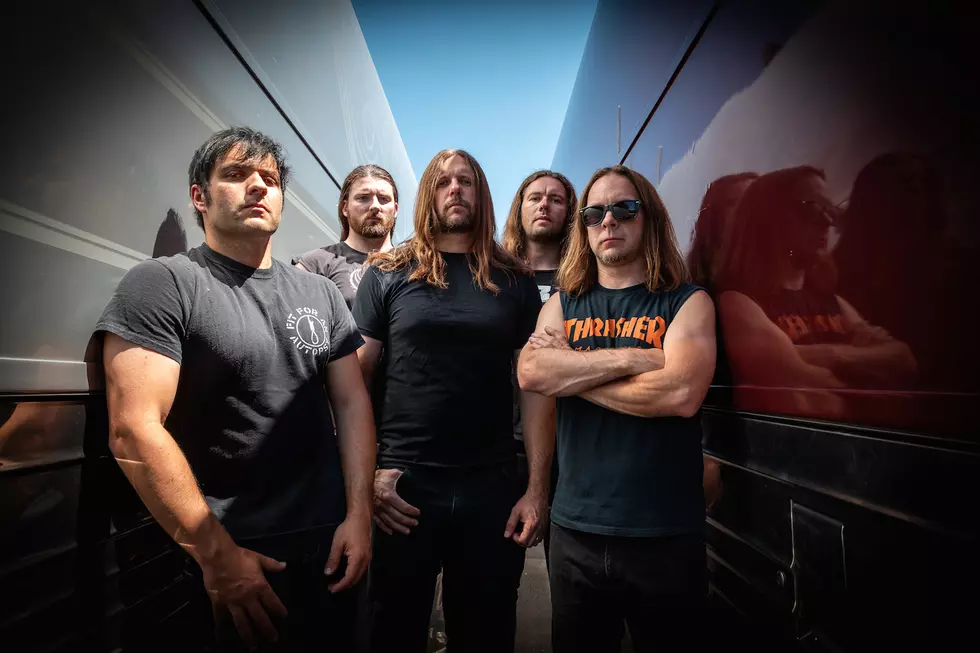
Unearth’s Trevor Phipps on Politics in Music: ‘This Is My Platform’
Unearth frontman Trevor Phipps was the latest guest on Full Metal Jackie's weekend radio program. The singer discussed the band's latest album, Extinction(s), which is focused on climate change and the impending dangers Earth potentially faces if neglected. He defended his right to engage politics in music, though he doesn't feel the environment should even enter the political conversation in the first place. Looking back on a career that started in the early 21st century, Phipps also explained how Unearth's songwriting process has changed. Check out the chat below.
Unearth back with a new album called Extinction(s). It reflects the chaotic state of the world. What's the primary social concern that you felt you needed to call out with this album?
Each song deals with it on its own. Each one is different. There's a couple songs that talk about the environment and the changes that we're seeing. Most scientists believe it's brought on by our own doing, so that's the most urgent message on the record is that we need to clean up our act now or else we're going to be in for a whole world of hurt.
When you're making a politically conscious album like Extinction(s), what responsibility do you feel in terms of informing or educating an individual?
It's very important to me. I have a voice and I want to be heard. This is my platform. I think it's better than fighting with people over Facebook. So, I have my beliefs, and I'll do the most amount of research I can do on a certain topic that I feel needs to be spoken about.
On that same token, I'm trying to be more inclusive in trying to preach more unity with people and trying to get people to put aside their petty differences in order to find a more common ground. And we shouldn't politicize the environment. That shouldn't be a left or right wing issue. That's something that's gonna affect us all no matter what belief system you have. That's why it was so important for me on this record to jump into that.
Are you saying that arguing on Facebook isn't productive?
It's not at all. I think we all know that. For a while, I was pretty vocal on Twitter and then I just didn't see any real point in doing it. Once in a while, if something is really outlandish, I'll make a statement, but it doesn't get us anywhere. I think people find emotion in music and if I can put some passion and some knowledge behind a subject, then if that reaches some people and gets them to kind of think a different way and kind of come to a more centered way of thinking, then I think that's what my job is for.
The Stings of Conscience came out back in 2001. When it comes to the craft of performing and making music, what's changed most about you since then and what is still the same?
Well, with the band it's quite different. We started as five guys all from the same area in Massachusetts. We would write songs by practicing in a basement. Twenty years later, our drummer, it's a different drummer. He lives in Seattle, and our bass player lives in Texas.
So, we don't get the change to actually rehearse together and write the records. The past two records were actually written at our own homes and just kind of passing files back and forth. And then we finally get to jam them when we fly the guys out to do pre-production. So, it's quite a different experience. There's good and bad for both ways. I still prefer getting in a basement and jamming it out or a garage with just a jam room. Which we eventually do, but the first process is just writing back and forth with files.
I guess there's less wasted time with that. It would be more up front. But sometimes that magic that is in the same room together doesn't happen when it's just passing files back and forth. But, that said, this record was our most prolific with the writing. We had 24 songs to start. Will Putney, our producer, helped us cut it down to the top 14 and then used 10 for the record.
The other four will be re-worked. And there are some parts in the other songs that will probably see the light of day on something in the future, as well. But we're not going to do any kind of special editions after the fact. Those four songs are dead and buried, but they'll definitely see some time out there on some other kind of release someday.
Trevor, just like the last album, all the tracks on the new LP are credited collectively to Unearth. How has your creative collaboration changed over time?
To get back to what I was saying on the last segment there, was we use to all write together in a basement and now we just pass files back and forth to start. But the way that we started this band was we wanted to look at each other as equals. So we're not going to give one a bunch more of a writing credit so they'll get a different royalty amount. We all have our two cents on how a song should be structured, and how it goes. One song or another might start with a Ken or a Buzz riff and it might be born from that, it might be all of their riffs for one song. All the lyrics are always mine. All the vocal structures are mine, but we split up the payments or just the credits evenly so we can keep ourselves in one happy camp, no one gets jealous of who is making $10 more than the other guy.
You, Buzz and Ken have remained the nucleus of the band since the beginning. What do you value the most about the relationship between the three of you?
At this point we're basically family. A lot of things go unsaid, we just kind of get it. Sometimes we'll make decisions we won't even make it a band thing, we'll just say, "Alright, this is the direction that we want to take this band" and then we'll incorporate the whole band after that. We've definitely been the three that started the band and I don’t know, they kind of feel like my brothers in a way.
Thanks to Trevor Phipps for the interview. Grab your copy of 'Extinction(s) on iTunes and Amazon and follow the band on Facebook to stay up to date with everything they're doing. Find out where you can hear Full Metal Jackie’s weekend show here.
Top 25 Metalcore Albums of All Time
More From Loudwire









